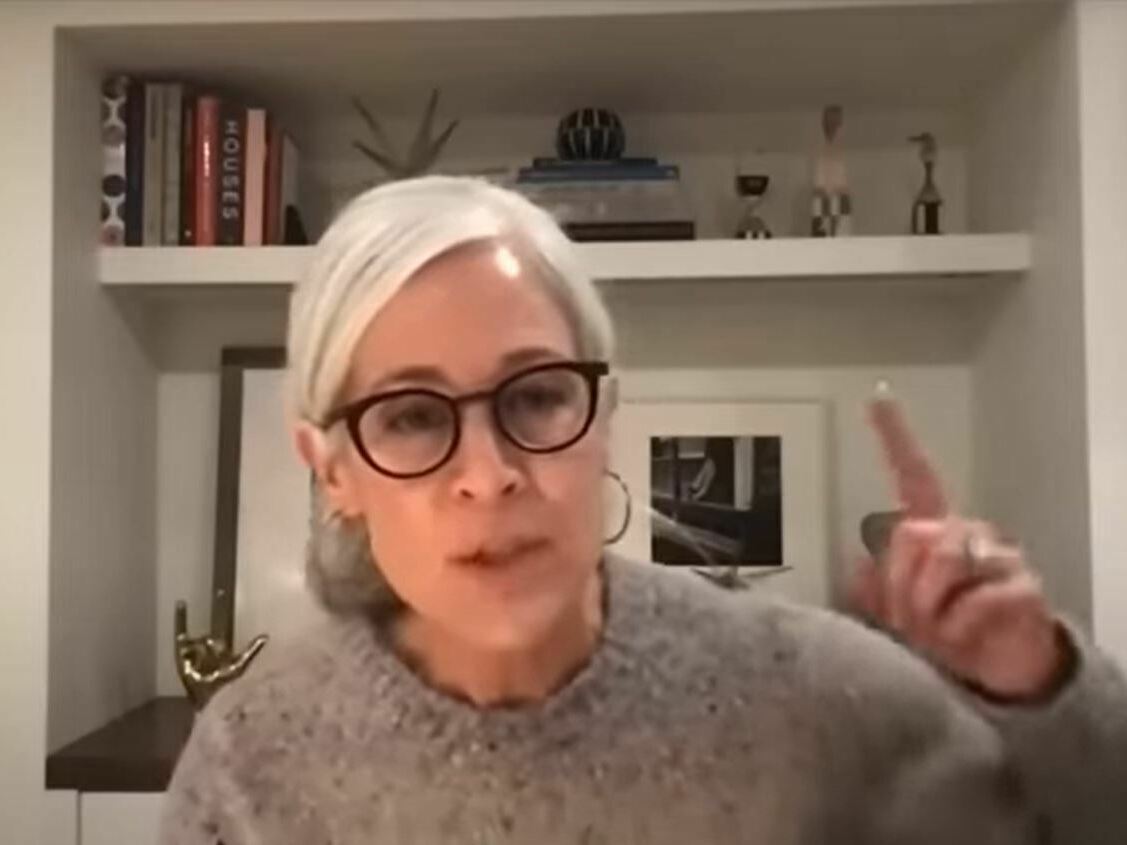[ad_1]

MillerKnoll CEO Andi Owen has come under fire on social media for telling employees to stop asking about the possibility of losing their bonuses.
Screenshot by NPR/YouTube
hide caption
toggle caption
Screenshot by NPR/YouTube

MillerKnoll CEO Andi Owen has come under fire on social media for telling employees to stop asking about the possibility of losing their bonuses.
Screenshot by NPR/YouTube
The CEO of an office furniture giant landed at the center of a social media storm this week after she told her staff to focus on being better employees instead of asking whether they’d lose their bonuses.
The leaked comments from MillerKnoll’s Andi Owen are sparking debate about workplace attitudes in the face of greater economic uncertainty and whether CEOs are out of touch with their staffs.
“Don’t ask about ‘what are we going to do if we don’t get a bonus?’ Get the damn $26 million,” Owen says in the video, in apparent reference to an internal financial performance target.
“Spend your time and your effort thinking about the $26 million we need and not thinking about what you’re going to do if you don’t get a bonus, all right? Can I get some commitment?” the CEO says, while waving her finger at her staff on the screen.
https://www.youtube.com/watch?v=5E10vnjJl5A
MillerKnoll CEO Andi Owen told employees to “leave pity city” and stop asking about whether they’d get bonuses.
Darren Debski
YouTube
The 80-second response to employees’ bonus questions came at the end of a 75-minute town hall primarily focused on customer service and performance goals. The company’s fiscal year ends in May, which is when bonus amounts are determined.
A clip of Owen’s comments was leaked to social media, and it spread widely across platforms. One version of the video posted to Twitter had been viewed more than 7 million times as of 6 p.m. ET on Tuesday.
Owen wraps up her remarks by sharing some advice she heard from a previous manager of her own: “I had an old boss who said to me one time, ‘You can visit pity city, but you can’t live there.’ So, people, leave pity city. Let’s get it done,” she says.
She then ends the meeting by saying, “Thank you. Have a great day,” raising her hands in a gesture of victory and mouthing the word “boom.”
Owen made nearly $4 million in bonuses in 2022
MillerKnoll says the clip was “taken out of context and struck a nerve.”
“Andi is confident in the team and our collective potential,” spokesperson Kris Marubio said in a statement shared with NPR.
Owen stepped up to lead the company, then Herman Miller, in 2018 after a decade in leadership roles at Gap Inc. The company acquired its top competitor, Knoll, in 2021, forming MillerKnoll.
The company’s portfolio of brands is known for its influential modern designs, including the Eames lounge chair and the Aeron desk chair, both of which retail for over $1,000.
As more and more companies embrace permanent virtual work, MillerKnoll’s revenue could be at risk, but the company’s overall sales numbers haven’t dropped in the last few years, public filings show.
As is typical for CEOs, Owen’s pay package includes incentive-based compensation. For the fiscal year ending in May 2022, she made $3.9 million on top of her fixed salary of $1.1 million.
It’s unclear whether she’ll receive a bonus for this filing year. In the video, she encourages her employees to “lead by example.”
CEOs are paid 399 times more than the average worker
The reaction to the video is just the latest in a string of public leaks of comments by company leaders that show them at odds with the attitudes of their staff during periods of economic hardship.
Starbucks’ then-CEO, Howard Schultz, was grilled, including by members of Congress, for 2022 leaked remarks calling a unionization effort an “outside force.” Braden Wallake, the CEO of marketing firm HyperSocial, took heat on social media for posting a selfie of himself crying after laying off employees.
“It’s the perfect storm of a few different developments that the pandemic has brought to bear,” says Dave Kamper, a senior policy coordinator with the Economic Policy Institute. “One is that inequality is even more obvious than it’s ever been. The CEO pay gap is higher now than it’s ever been.”
Kamper says the latest data (from 2021) shows that CEOs were paid 399 times more than a typical worker in their firm. Couple that with overall job growth in a post-pandemic economy, and workers are feeling more emboldened to stand up to leadership, Kamper says.
“CEOs are just not having the same conversation that their workers are,” he explained. “I think you’ve got a lot of companies that are hoping this storm of workers actually having a voice will pass.”
The question to watch, he says, is whether the surge of worker power will last long enough to convince CEOs to change their tune.
NPR’s Fernando Alfonso III contributed reporting.
[ad_2]
Source link



